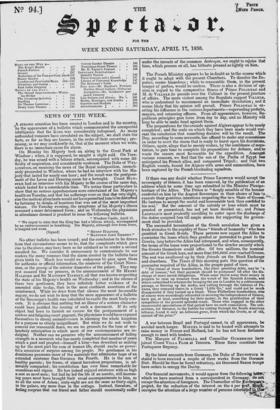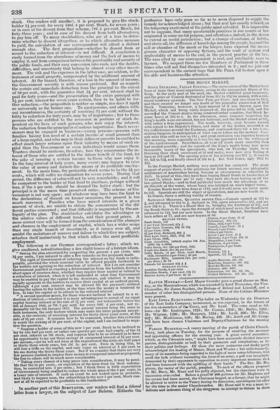Our financial movements, it would appear from the followitg which
we have received from a correspondent in Germany, do. nbt escape the attention of foreigners. The Chancellor of the x !..? • ' project, for the reduction of the interest on the 4 .per ‘1,•• .4" occupies the attention of a large number of persons mter "fed'
1.•••
stock. Our readers will recollect, it is proposed to give the steck- holder 34 per cent. for every 1001. 4 per cent. Stock, for seven years ; or in case of his dissent from that scheme, 70/. 5 per cent. Stock, for forty-three years ; and in case of his dissent from both alternatives, to pay him off: To many stockholders, who are at a loss to deter- mine whether to dissent altogether, or to which alternative measure to yield, the calculation of our correspondent will afford a distinct enough clue. The first proposition—whether to dissent from or assent to the reduction of interest—is not difficult. A conclusion is easily formed from the abundance of money and the lack of means to employ it and from compaiison between the punctuality and security of - the public funds, and their easy conversion into cash, and the doubts, ,difficulties, and uncertainty that belong to almost every other invest- ment. The risk and the expenses in the latter case, are seldom, in the 4 instances of small property, compensated by the additional amount of interest. At the hazard, therethre, of a loss in the amount of income, the Government security is with reason preferred. But as regards the certain and immediate deduction from the principal to the extent of 30 per cent., with the guarantee that 31 per cent. interest shall be ' paid for forty years—and the preservation of the entire principal with • 3,11. per cent. interest for seven years certain, then to be liable to fur- ther reduction,—the proposition is neither so simple, nor does it apply oo universally as the fOrmer one. To aged persons, and others with- • out incumbrances, the certainty of receiving 31 per cent. without lia- bility to reduction for forty years, may be of importance ; but to those persons who are entitled to the reversion in portions of stock de- . pendent on the lives of snch persons, who now enjoy the interest, the reduction from the principal is of serious importance. Such rever- sioners may be engaged in business—young persons—persons with families having less need of a certain income of small amount than of a large capital, and who mayin their different pursuits be enabled to effect much larger returns upon their industry by means of such ca- • ppital than the Government or even individuals would assure them. Trustees should be cautious, therefore, how they compromise the in- terest of those who are entitled to the future benefit of the fund, for the sake of insuring a certain income to those who now enjoy it. In the long interval of forty years, many events may happen to raise the value of money and furnish the means of its profitable employ- ment. In the mean time, the preferable stock seems to be the 34 per cents., which will suffer no diminution for seven years. During that period, the difference of value will not be very remarkable ; and it will be competent to the holder of that fund to purchase, perhaps without -loss, if the 5 per cent. should be deemed the better stock; but the .principal is in the mean time preserved entire. The scheme of Go- • vernment is not very open ; and whatever may have been the limit to the declarations of dissent on former occasions, the present is too much narrowed. Families who have mixed interests in ' a given amount of stock, are unable to obtain the concurrence of the dif- ferent parties concerned ; and that difficulty is augmented by the am- • biguity of the plan. The stockbroker calculates the advantages or the relative values of different funds, and their present prices. A more correct view will be formed from the consideration of the changes and chances in the employment of capital, which has a wider scope than any single branch of investment, as it ranges over all, and amidst the mutations of success and failure to which they are subject, 'attaches itself instinctively to that which offers the most profitable .employment. The following is our German correspondent's letter ; which we give unaltered, notwithstanding a few slight traces of a foreign idiom. "Seeing the plan advertised for conyerting the present 4 per cents. into • ai per cents., I am induced to offer a few remarks on the proposals made. The right of Government of reducing the interest on the funds is indis- putable, provided the whole nominal value be offered payable forthwith to the holders not agreeing to the reduction of interest. But I do not consider Government justified in exacting a determination from the holders, during a • short space of nineteen days, whether they require their capital or submit to a reduction of interest, when it is left undecided at what time Government may be enabled to pay the capital to the dissenters, and whether it may be -equally agreeable to the holders to receive their capital at an unfixed period,
• (although 4 per cent. interest may be allowed till the payment) without leaving the option to the holder, at the time when the money is tendered to ' him, to take the capital or to submit to the reduced interest. • "A second question arises, for those who are inclined to submit to a re- duction of interest,—whether it is-more advantageous to accept of an equal capital bearing interest at the rate of 31 per cent. not redeemable before the
• 5th of January 1840, or 70/. 5 per cent, for every 100/. 4 per cent., not re- deemable till the 5th January 1873. The present interest being the same in both instances, the only feature which may make the latter proposal accept- able, is the certainty of receiving interest for thirty-three years more, at the rate of 31 per cent. It remains now to be examined, whether this certainty • is worth the sinking of 30 per cent of the capital, and I am inclined to nega- tive the question. . "Suppose a holder of some of this new 5 per cent. Stock to be inclined to 'lay by one half per cent. or-rather one quarter per cent. half-yearly, of the 31 per cent. interest on 70/. stock, and suppose him to be so situated as to have 'an opportunity to lay out these savings at compound interest of 3+ per cent. per annum,—yet he will not have at the expiration of the sixty-six half years or thirty-three whole years, but 29/. 3s. per cent. Even in doing this, he will lose a trifle on the capital, and only enjoy an interest of 3 per cent. to his use during the thirty-three years. But if we consider that there are very few persons enabled to employ their money at compound interest as proposed, 'the loss to others will be much more considerable.
;
"Taking every chance of along peace into consideration, it may be possi- ble that the 31 per cents., on expiration of the term fixed for their redemp- tion, be converted into 3 per cents.; but I think there is little expectation .-of Government being enabled-to reduce the whole mass of the 3 per cents. to a lower rate of interest. If such an event be not looked upon as probable, and likely to happen soon, the subscribing to the new 5 per cent. Stock can- not at all be expected to be profitable to the fundholders.'



















